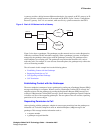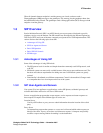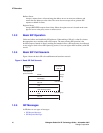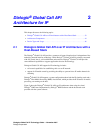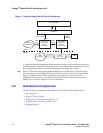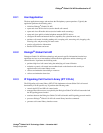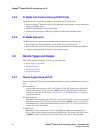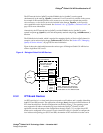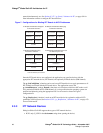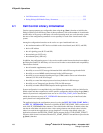Dialogic
®
Global Call IP Technology Guide — November 2007 45
Dialogic Corporation
Dialogic
®
Global Call API Architecture for IP
2.2.1 Host Application
The host application manages and monitors the IP telephony system operations. Typically the
application performs the following tasks:
• initializes Dialogic
®
Global Call API
• opens and closes IP line devices (used to handle call control)
• opens and closes IP media devices (used to handle media streaming)
• opens and closes public switched telephone network (PSTN) devices
• configures IP media and network devices (capability list, operation mode, etc.)
• performs call control, including making calls, accepting calls, answering calls, dropping calls,
releasing calls, and processing call state events
• queries call and device information
• handles PSTN alarms and errors
2.2.2 Dialogic
®
Global Call API
Dialogic
®
Global Call API hides technology and protocol-specific information from the host
application and acts as an intermediary between the host application and the technology call
control libraries. It performs the following tasks:
• performs high-level call control using the underlying call control libraries
• maintains a generic call control state machine based on the function calls used by an
application and call control library events
• collects and maintains data relating to resources
• collects and maintains alarm data
2.2.3 IP Signaling Call Control Library (IPT CCLib)
The IP Signaling call control library (IPT CCLib) implements relevant Global Call call control
functionality in an IP-specific way. It performs the following tasks:
• controls the H.323 and SIP call control stacks
• manages IP media resources as required by the Dialogic
®
Global Call API call state model and
the IP signaling protocol model
• translates between the Dialogic
®
Global Call API call model and IP signaling protocol models
• processes Dialogic
®
Global Call API call control library interface commands
• generates call control library interface events



